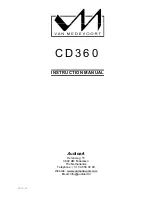
18
| English
1 609 929 S28 | (3.12.08)
Bosch Power Tools
Vibration total values (triax vector sum) deter-
mined according to EN 60745:
Vibration emission value a
h
=7.8 m/s
2
, Uncer-
tainty K =1.5 m/s
2
.
The vibration emission level given in this infor-
mation sheet has been measured in accordance
with a standardised test given in EN 60745 and
may be used to compare one tool with another.
It may be used for a preliminary assessment of
exposure.
The declared vibration emission level repre-
sents the main applications of the tool. However
if the tool is used for different applications, with
different accessories or poorly maintained, the
vibration emission may differ. This may signifi-
cantly increase the exposure level over the total
working period.
An estimation of the level of exposure to vibra-
tion should also take into account the times
when the tool is switched off or when it is run-
ning but not actually doing the job. This may sig-
nificantly reduce the exposure level over the to-
tal working period.
Identify additional safety measures to protect
the operator from the effects of vibration such
as: maintain the tool and the accessories, keep
the hands warm, organisation of work patterns.
Declaration of Conformity
We declare under our sole responsibility that
the product described under “Technical Data” is
in conformity with the following standards or
standardization documents: EN 60745 accord-
ing to the provisions of the directives
2004/108/EC, 98/37/EC (until 28 Dec 2009),
2006/42/EC (from 29 Dec 2009).
Technical file at:
Robert Bosch GmbH, PT/ESC,
D-70745 Leinfelden-Echterdingen
Robert Bosch GmbH, Power Tools Division
D-70745 Leinfelden-Echterdingen
12.11.2008
Assembly
f
Before any work on the machine itself, pull
the mains plug.
Changing the Tool
f
Be cautious when replacing the planer
blades. Do not grasp the planer blades by
the cutting edges.
Possible danger of injury
due to the sharp cutting edges of the planer
blades.
Use only original Bosch carbide blades (TC).
The carbide blade (TC) has 2 cutting edges and
can be reversed. When both cutting edges are
dull, the planer blade
14
must be replaced. The
carbide blade (TC) may not be resharpened.
Disassembling the Planer Blade(s)
(see figure A)
To reverse or replace the planer blade
14
, rotate
the blade drum
11
until it is parallel to the plan-
er base plate
9
.
n
Loosen the two fastening screws
13
with
the Allen key
15
by approx. 1 – 2 turns.
o
If necessary, loosen the clamping element
12
by giving it a light blow with a suitable
tool (e.g. a wooden wedge).
p
Push the planer blade
14
sidewards out of
the blade drum
11
with a piece of wood.
Assembling the Planer Blade(s) (see figure B)
The guide groove of the planer blade always en-
sures continuous height adjustment when re-
placing or reversing it.
If required, clean the blade seat in the clamping
element
12
and the planer blade
14
.
When assembling the planer blade, ensure that
it is seated properly in the blade holder of the
clamping element
12
. The planer blade must be
assembled and aligned
centred to the planer
base plate
9
Afterwards tighten the 2 fastening
screws
13
with the Allen key
15
.
Note:
Before restarting, check if the fastening
screws
13
are tightened well. Rotate the blade
drum
11
by hand and ensure that the planer
blade does not graze.
Dr. Egbert Schneider
Senior Vice President
Engineering
Dr. Eckerhard Strötgen
Head of Product
Certification
OBJ_BUCH-446-002.book Page 18 Wednesday, December 3, 2008 8:53 AM
















































